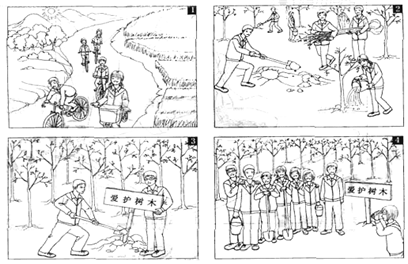题目内容
5.情景作文假设你是红星中学高三一班的学生李华,为响应绿化祖国的号召,你班四月十二日去郊区植树,请根据以下四幅图的先后顺序,介绍植树活动的全过程,给某英文杂志的"绿色行动"专栏写一篇以"Green Action in Our Class"为题的英文稿件.
注意:词数不少于60
提示词:郊区 suburbs

Green Action in Our Class
April 12 is memorable because our class had a meaningful experience on that day.In the morning,we bicycled to the suburbs to plant trees,talking and laughing all the way.Upon arrival,we began to work immediately.Some were digging holes.Some were carrying and planting young trees.Others were watering them.After getting the work done,we put up a board reminding people to protect the trees.Before leaving we took some photos to record our green action.Seeing the lines of trees,we all had a sense of achievement.We feel it's our duty to protect and beautify our environment..
分析 本篇看图写作分四幅图画,要求考生介绍一次植树活动.在写作的时候首先要观察四张图的内容,按照图片所标出的数字理解事情发展的先后顺序,以便自己能够抓住图片中所发生的事情和主要内容进行写作.同时,考生还要注意的是在写作过程中所运用的时态要以一般过去时为主.除此以外,要注意写作过程中注意使用平时学到的短语和句型,注意行文的连贯和逻辑性.
重要短语:
put up,竖起,a sense of achievement,成就感
高分句子:
1.Upon arrival,we began to work immediately.本句中,Upon加短语加句子为重要句式,意为一…就…
2.Seeing the lines of trees,we all had a sense of achievement.本句前半句为现在分词做状语,丰富句子内容.
解答 Green Action in Our Class
April 12 is memorable because our class had a meaningful experience on that day.(引出下文)In the morning,we bicycled to the suburbs to plant trees,talking and laughing all the way.Upon arrival,we began to work immediately.(高分句型)Some were digging holes.Some were carrying and planting young trees.Others were watering them.After getting the work done,we put up a board reminding people to protect the trees.Before leaving we took some photos to record our green action.(描述图片内容)Seeing the lines of trees,we all had a sense of achievement.(高分句子)We feel it's our duty to protect and beautify our environment.(总结)
点评 图画作文就是根据给出的一幅或几幅图画所提供的信息写短文.写好看图作文,考生应注意运用熟悉的英语词汇、句型等,运用多样化的句式,注意长短句的结合、简单句和复合句的结合;还要注意上下文的衔接,过渡要自然.最后认真检查,查漏补缺.

| A. | who | B. | whomever | C. | no matter who | D. | whoever |
| A. | so | B. | or | C. | yet | D. | for |
| A. | voices had come | B. | came voices | ||
| C. | voices would come | D. | did voices come |